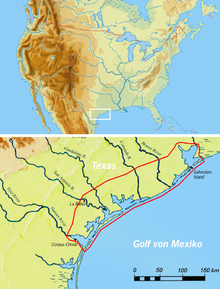 Karankawa territory. The Kopano lived near
San Antonio Bay | |
| Total population | |
|---|---|
| extinct since the mid-19th century | |
| Regions with significant populations | |
| United States ( Texas) | |
| Languages | |
| Karankawa language | |
| Religion | |
| Indigenous religion, Roman Catholicism | |
| Related ethnic groups | |
| other Karankawa peoples |
The Copano were a Native American sub-tribe of Karankawa peoples from Texas.
Territory
The Copano lived along the Gulf Coast of Texas, between Copano and San Antonio Bays. [1]
Name
The Copano were also known as the Cobane, Copane, Coopane, and Kopano Indians. [1] El Copano Port was named for the tribe, who lived in the area in the 18th century. [2]
History
Between 1751 and 1828, the Kopano interacted with the Nuestra Señora del Rosario and Nuestra Señora del Refugio Missions. [1] Those that survived the mission era likely merged into other Karankawa groups, but by 1858 all Karankawa tribes had died off. [1]
References
- ^ a b c d Campbell, Thomas N. "Copane Indians". Texas State Historical Association. Retrieved 4 September 2023.
- ^ "El Copano". Bayside Historical Society. Retrieved 4 September 2023.
 Karankawa territory. The Kopano lived near
San Antonio Bay | |
| Total population | |
|---|---|
| extinct since the mid-19th century | |
| Regions with significant populations | |
| United States ( Texas) | |
| Languages | |
| Karankawa language | |
| Religion | |
| Indigenous religion, Roman Catholicism | |
| Related ethnic groups | |
| other Karankawa peoples |
The Copano were a Native American sub-tribe of Karankawa peoples from Texas.
Territory
The Copano lived along the Gulf Coast of Texas, between Copano and San Antonio Bays. [1]
Name
The Copano were also known as the Cobane, Copane, Coopane, and Kopano Indians. [1] El Copano Port was named for the tribe, who lived in the area in the 18th century. [2]
History
Between 1751 and 1828, the Kopano interacted with the Nuestra Señora del Rosario and Nuestra Señora del Refugio Missions. [1] Those that survived the mission era likely merged into other Karankawa groups, but by 1858 all Karankawa tribes had died off. [1]
References
- ^ a b c d Campbell, Thomas N. "Copane Indians". Texas State Historical Association. Retrieved 4 September 2023.
- ^ "El Copano". Bayside Historical Society. Retrieved 4 September 2023.